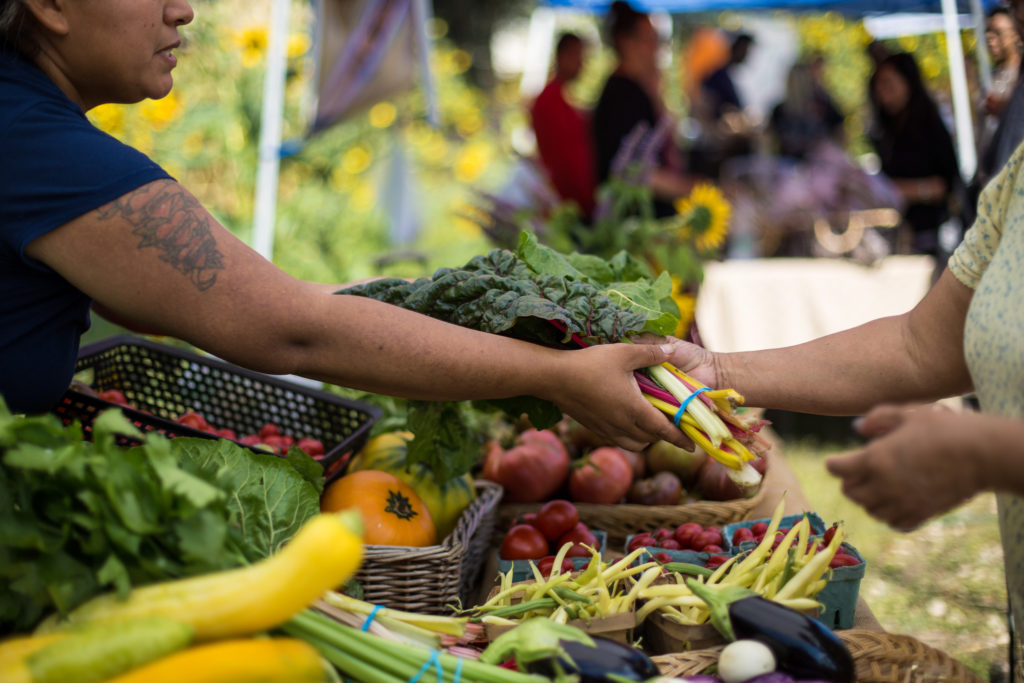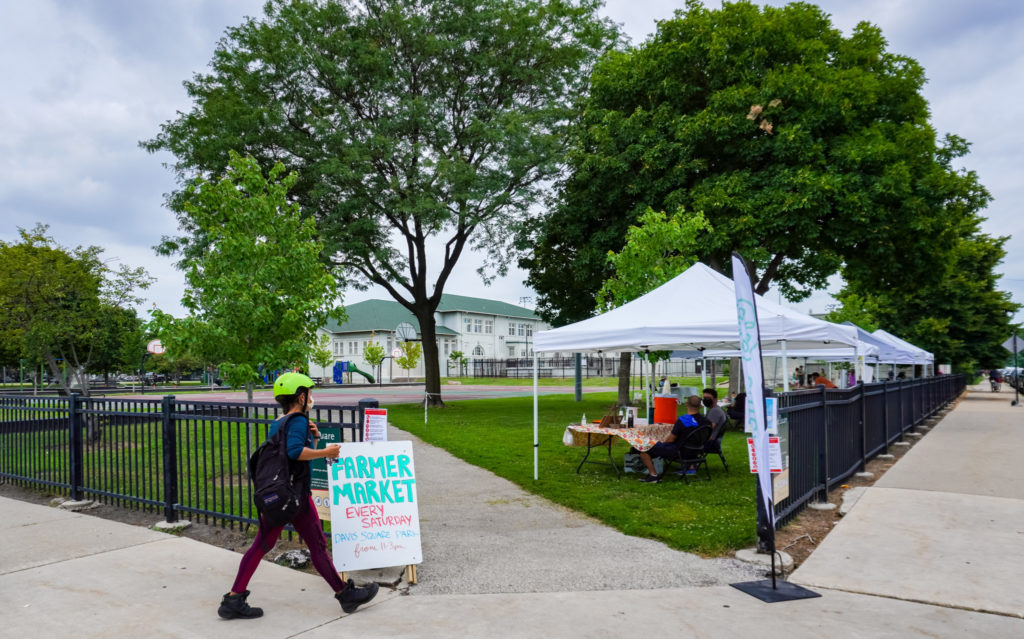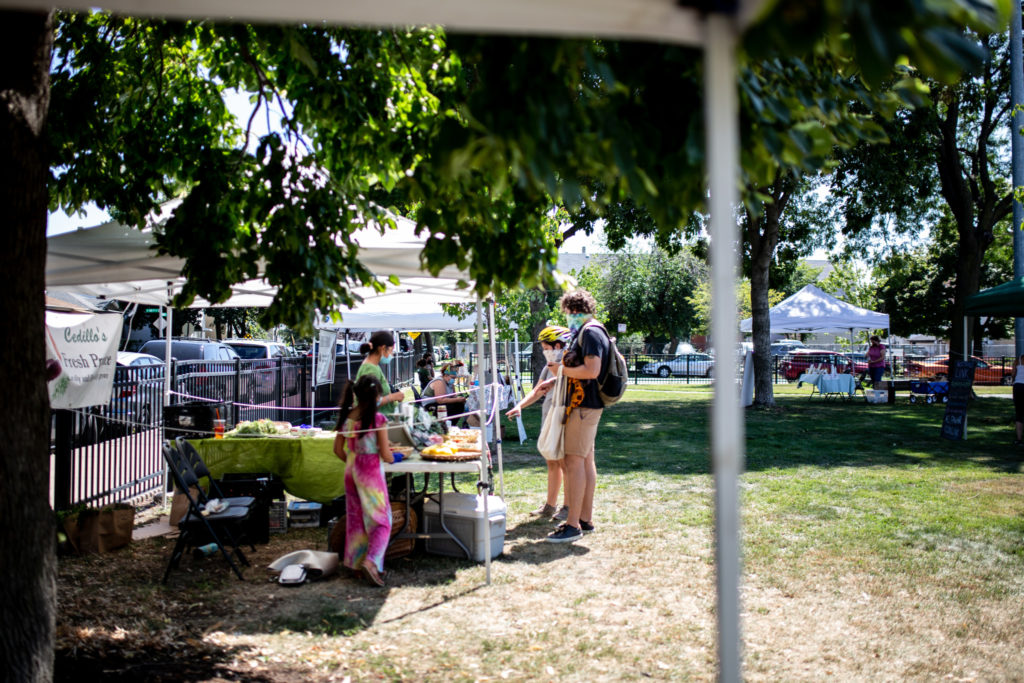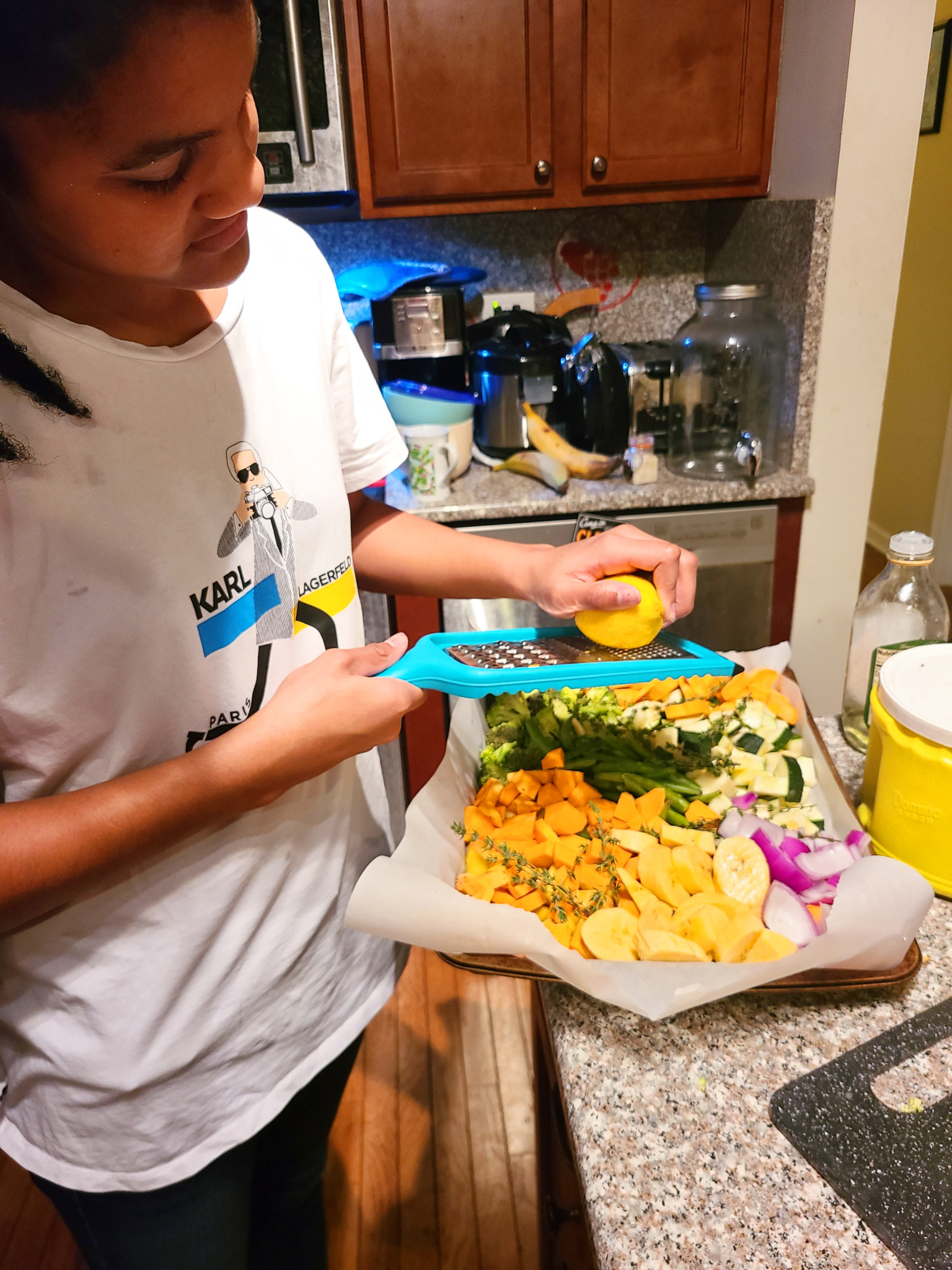“I’m more conscious when I go to the store,” said Sheila Jones, in describing how Plant Chicago’s Link Box program has supported her and shifted her perspective during COVID-19. “I’m more conscious about what I’m picking up–where it’s coming from. … I’m just more aware of helping out the community,”
The Link Produce Box program allows Link Card holders to use their benefits to purchase a weekly assortment of fresh produce, bread, and eggs from local farms through the Back of the Yards nonprofit Plant Chicago, in partnership with The Urban Canopy.
Nine months ago, Chicagoans emptied grocery store shelves across the city in panic as the city shut down. Some grocery stores hustled consumers with ridiculous prices on everyday items. Food distribution efforts provided some support, but people faced long lines or were overwhelmed by the quantity of food given at once. On top of this, some Link Card holders may have faced public transportation barriers, along with additional COVID-19 concerns such as managing virtual learning, health concerns, and housing insecurity. The pandemic also amplified ongoing food insecurity across the South and West Sides due to existing inequalities and the vulnerabilities of international food chains.
Many Link Card holders were in tough positions. Even with emergency EBT benefits that increased funds, access to food last spring was still a challenge. Without much food on shelves, and Link denied for online food markets at that time, purchasing power was deeply constrained. In April, as a response to the pandemic, Elizabeth Lyon and Stef Funk at Plant Chicago brainstormed the Link Box program to mutually support consumers and local farmers. The goal was to connect harvests to homes despite social distancing and economic hardships.
“At the beginning of the pandemic, we weren’t sure if farmers markets were going to be allowed to open at any point in the season. And we knew, of course, that people still needed food, and [that] our growers were feeling very anxious because they had spent all this time planning anticipating markets to go as usual,” said Funk, the former program coordinator at Plant Chicago.

Keeping food affordable was a high priority. Lyon, Plant Chicago’s small business and circular economy manager, said there are “bigger factors, like you lost your job in the pandemic, and it’s just harder to afford everything. I think that’s happening to more people.”
Many Link Box participants faced similar concerns this past spring. “Right around the time they started doing shelter in place, I was looking to see what the farmers market situation was going to be [and] if I was going to be able to do some sort of SNAP matching somewhere, and ended up through a bunch of Google searching, finding Plant Chicago,” said Gregory Morland, an early Link Box participant.
For many, the Link Box program provided an alternative to shopping indoors and buying industrially produced food, and overcame the temporary shut down of farmers’ markets. Priced on a suggested sliding scale from $15-$25, the boxes are affordable to many — and for customers running low on cash, Plant Chicago created alternative payment plans to ensure no one is turned away.

Reserving a box only requires a phone call or completion of an online form before picking it up at the Plant Chicago space; ten boxes are available for Link Card holders each week. Program participants who are essential workers or have family members with higher medical risks described the program as a missing safety net during this pandemic. They noted how the box has minimized at least one form of stress. And as the pandemic continues, many look forward to purchasing this box as long as it is funded.
“My mom can’t really go to the store right now because of the COVID. Getting that box for her is extra special because she’s able to get a lot of the stuff that she would want anyways. But she can’t because she can’t go out shopping to look around for these things,” said Jesse Iñiguez, co-founder of Back of the Yards Coffeehouse.
For Jones, who works at a nursing home, this program has also been a source of relief. “I have two kids,” she said. “I’ve been working the whole time but funds are kind of limited, so I’m just trying to ensure that my kids, my family, [and] myself are eating healthy. It’s been hard. Having the Link Box, we are exposed to so many different things that we wouldn’t otherwise [have] picked up or wouldn’t get normally, going to the store.”
Nutritious food security also supports mental health, according to Funk, who is currently the communications coordinator for the Chicago Food Policy Action Council. “The food that people are getting [in the Link Box program] is actually better for them and provides their bodies more nutrients, which I mean manifests in all kinds of ways. People are eating less empty calories so they’re less hungry … and they feel healthier which manifests in all sorts of ways,” said Funk. “If you’re hungry you can’t really focus. But again, if you don’t know where your next meal is coming from, it’s also a source of stress and maybe a reason why people can’t focus.”

Jones says she has noticed the impact of locally grown food in both her body and her mind. “It is just having an opportunity to really nourish yourself,” she said. “It also kind of sparks me.”
True food security is not simply obtaining food but also having a connection to food through interpersonal experiences and bodily senses. The Link Box program has helped many participants strengthen their relationships to food, attuning them to natural food cycles and regional systems of growth.
“Access to fresh, local fruits and vegetables, is really important, “said Iñiguez. “My mom’s new allergies have forced us to really look at food in a different way.” His multigenerational family, spread across three households, has bonded over food preparation designed to help his mom transition to a new diet featuring fresh foods.
“I wish that more organizations and more neighborhoods would do this,” he said. “It benefits not only the families that are purchasing it, but also the farmers that are growing this. It allows them to not have to go commercial.”
Self-described “Produce Hound” Gregory Morland said, “we’ve been getting our box every week since. [We] eat everything in it and have really enjoyed the constant variety of really good produce. And it’s been a really fun exploration! We’ve had a lot of stuff that we don’t normally eat. But it’s been a really interesting creative challenge of like, Oh, man we got a bunch of peaches [that] we have to eat today. What are we gonna do?”
“It’s really important to give everybody options as to what they’re eating. Food affects the lives of literally everybody on the planet,” Funk said.
Jones says her children have a deeper understanding of where their food comes from since she started using the program. “And then with us growing a little bit, understanding how much it takes for us to have this food, so they appreciate it more. I’ve never grown anything. Everything’s always died, so this just sparked my interest…This is my spark, and I definitely want to continue.”
For more information on the Link Produce Box program, fill out this online form or call Plant Chicago at (773) 847-5523, at least one week in advance. Pickup hours are Thursday from 2-5pm and Friday and Saturday from 11am-3pm at 4459 S. Marshfield Ave.
Jocelyn Vega is a first-generation Latina and a contributing editor to the Weekly. She last wrote about McKinley Park and Brighton Park for the Weekly’s Best of the South Side issue.

